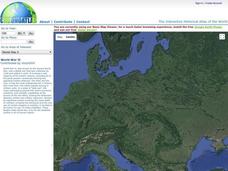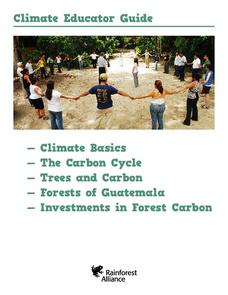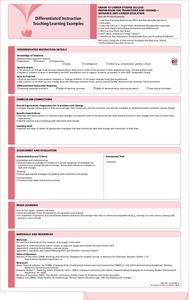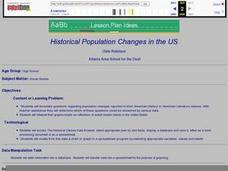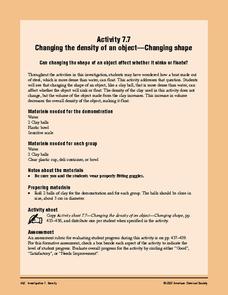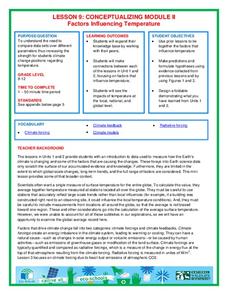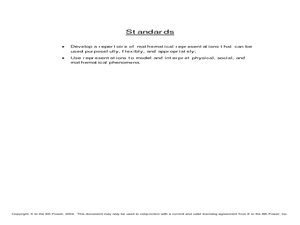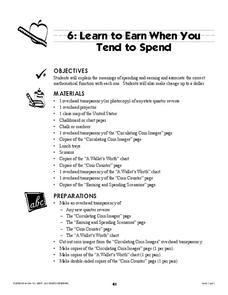Chicago Botanic Garden
Faces of Climate Change
Sometimes, the best solution to a problem can be found by walking in someone else's shoes. Here, scholars use character cards to take on the roles of people around the world. They determine how their character's life affects our...
Overcoming Obstacles
Adapting to Change
Peter Pan doesn't want to grow up and doesn't want to change. Many middle schoolers feel the same way. The first lesson in the "Looking to the Future" module underscores the concept that change is a natural part of life and that a...
Illustrative Mathematics
The Price of Bread
As part of an initiative to strengthen our young adults' financial understanding, this problem explores the cost of bread and minimum wage since the 1930s. Learners are asked to find the percent increase from each year and compare it...
EngageNY
Grade 9 ELA Module 1, Unit 1, Lesson 7
A story about feral girls raised by werewolves will have some interesting character development! Track how the girls and their teachers act, speak, and change with a lesson focused on Karen Russell's "St. Lucy's Home for Girls Raised by...
Consortium for Ocean Science Exploration and Engagement (COSEE)
Ocean Acidification: Whats and Hows
Open this instructional activity by demonstrating the production of acidic carbon dioxide gas by activated yeast. Emerging ecologists then experiment with seashells to discover the effect of ocean acidification on shelled marine...
Rainforest Alliance
Climate Educator Guide
Climate change is a hot topic in the news. Class members examine carbon dioxide data to analyze trends of our atmospheric makeup over time. They also discuss climate and climate change, and determine how these changes are affecting life...
US Environmental Protection Agency
Carbon Through the Seasons
Meteorologists view an animated video by the Environmental Protection Agency to learn how the carbon cycle works, and then move into groups to analyze and graph actual data of the atmospheric carbon dioxide concentration from Hawaii's...
EduGAINs
Preparation for Transitions and Change— Guidance and Career Education
Every hopeful in your class has gone through some kind of life change, from parents' divorce to a death in the family to moving up into another grade. Encourage them to discuss these changes, the skills they used and acquired during...
Curated OER
Historical Population Changes in the US
Young scholars conduct research on historical population changes in the U.S. They conduct Internet research on the Historical Census Data Browser, create a bar graph and data table using a spreadsheet program, and display and interpret...
Global Change
The Carbon Cycle and its Role in Climate Change
So how does the carbon cycle work? Kids participate in a hands-on activity that allows them to understand the chemistry behind climate change and global warming. They act out the process of photosynthesis by labeling themselves as...
NASA
The Big Climate Change Experiment Lesson 5: Climate Change Narratives
And now moving on to the next story. The last of five lessons in Unit 1: The Big Climate Change Experiment requires groups to create a script for a news segment on climate change. They either make a video of their story or conduct a live...
Curated OER
Making Change
Second graders explore how to incorporate a new type of technology, the cash register and/or a calculator, as a motivational tool for solving real life problems. They practice estimating money and counting back change from $20.00.
American Chemical Society
Changing the Density of an Object - Changing Shape
Continuing with the concept of volume and its effect on density, learners now work with a piece of clay to see if they can get it to float in water. This is a memorable end to a seven-part investigation of density. Make sure to check out...
American Chemical Society
Changing the Density of an Object - Adding Material
For this sixth of seven activities revolving around the concept of density, physical science fans figure out if anything can be done to change the density of an object. Demonstrate by placing a can of regular and a can of diet soda into...
Cornell University
Energy Changes in Chemical Reactions
The heat of solution measures how much thermal energy a dissolving substance consumes or gives off. The experiment demonstrates both endothermic and exothermic reactions. Scholars dissolve several substances, measure the temperature...
Curated OER
Water 1: Water and Ice
Students explore the states of water. In this science lesson, students use observation, measurement, and communication skills to describe water as it changes from a solid to a liquid.
Curated OER
Physical Changes and States of Matter
Fourth graders identify a physical change as one that results in a change in size, shape, or state of matter. After an initial teacher-led discussion and demonstration, groups of students get together to perform an experiment which...
UNICEF
Get Real on Climate
Climate change isn't just about a warming planet; it will affect humans' health, spread of disease, changes in heat waves and droughts, and changes in storms and wildfires. Participants explore global climate change through discussions...
National Wildlife Federation
Conceptualizing Module II - Putting It All Together
"Creativity is just connecting things." - Steve Jobs. After weeks of researching climate change, the ninth lesson in a series of 21 combines the data and analysis to address essential questions. It covers natural phenomenon, human...
NOAA
Stressed Out!
Are our oceans really suffering due to the choices humans make? The sixth and final installment in the volume of activities challenges research groups to tackle one of six major topics that impact ocean health. After getting to the...
Curated OER
Count, Compare and Make Change
Second graders review the value of coins and how to make change. In this counting money instructional activity, 2nd graders compare coins, practice making change, and review the value of coins using hands-on activities.
Center for Learning in Action
Investigating Physical and Chemical Changes
Super scientists visit ten stations to predict, observe, and draw conclusions about the physical and chemical changes that occur when different states of matter—liquid, solid, and gas—are placed under a variety of conditions. To...
Center for Learning in Action
Water—Changing States (Part 1)
Here is part one of a two-part lesson in which scholars investigate the changing states of water—liquid, solid, and gas. With grand conversation and up to three demonstrations, learners make predictions about what they think will happen...
Curated OER
Learn to Earn When you Tend to Spend
Analyzing and understanding word problems is extremely important. Pupils learn that in money problems, earn usually means you add and spend usually means you subtract. They will solve a series of money-related word problems, label coins,...




